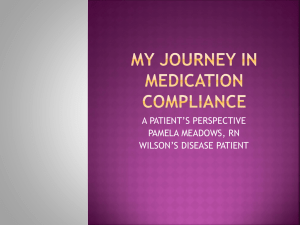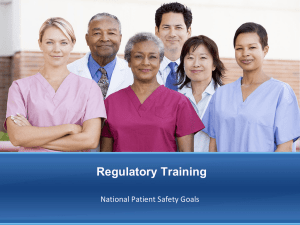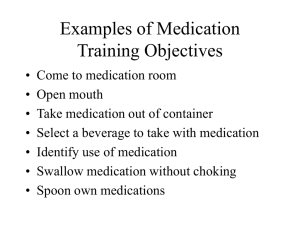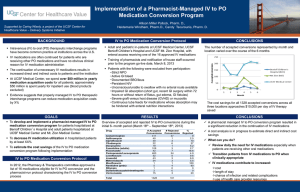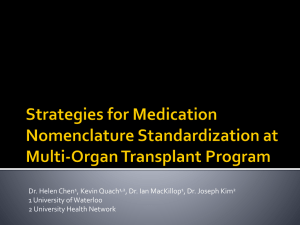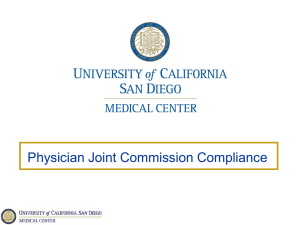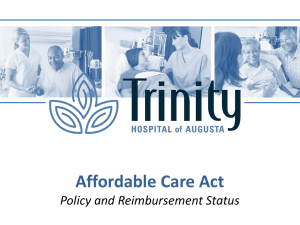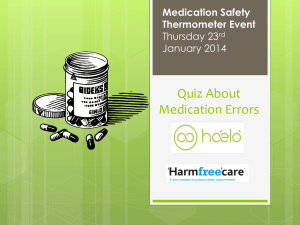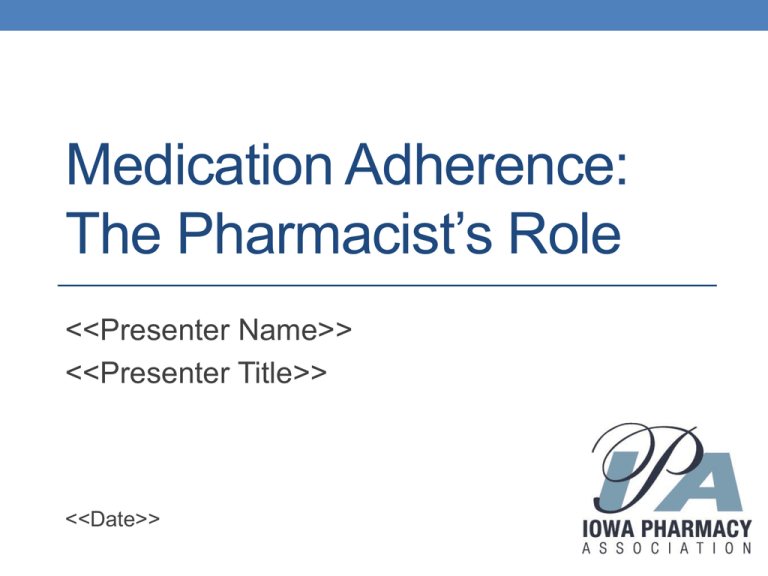
Medication Adherence:
The Pharmacist’s Role
<<Presenter Name>>
<<Presenter Title>>
<<Date>>
Outline
• Define adherence and compliance
• Examples of non-adherence and
non-compliance
• Barriers to medication adherence and
compliance
• The impact of non-adherence and noncompliance
• The patient’s role
• The pharmacist’s role
What is Adherence?
• The act of filling a new prescription for the
first time, or refilling prescriptions on-time
Starting the medication
as soon as possible
Taking the medication
correctly
Taking the correct
medication
What is Compliance?
• The act of taking medication as the doctor
intended
• Correct medication
• Correct amount of medication
• Correct time of day
• Correct length of time
Adherence and Compliance is related to:
• Knowledge and beliefs about illness
• Motivation to get better
• Confidence in ability to help oneself get better
• Expectation about the outcome of treatment and
results from not being adherent
Medication Non-Adherence Includes:
• Fail to fill the first
prescription
• Fail to refill prescription, as
directed
• Skipping doses
• Taking more OR less of a
medication than prescribed
• Stopping the medication too
soon
• Taking dose at the wrong
time
• Taking someone else’s
medication
• Taking medication with
foods, drinks, or other
medications it shouldn’t be
used with
• Taking expired medications
• Storing medications in the
wrong place
• Using devices improperly
(such as inhalers)
Barriers to Taking Your Medications:
• Can’t always see or feel the benefits of your medications
• Side effects
• Unsure what your medication is being used for
• Busy schedule or lifestyle
• Multiple medications, with multiple doses per day
• Hard to remember
• Concerned about risks of your medications
• Don’t feel like you need the medication
• Cost
Why Is This Important?
• “Drugs don’t work if people don’t take them.”
– C. Everett Koop
• “People who take their medication as prescribed may
have a better chance of living healthier lives.”
– MERCK
• “The
investment in prescriptions can have the greatest impact
when medication is used correctly and correct use can be
achieved through supporting better communication and
coordination between individuals and their health care team.”
–Randall Rutta, Easter Seals
Did you know…..
• Adherence decreases dramatically in the 1st three months
of taking a medication (MERCK)
• 64% of people who take medications are not adherent
• Adherence is needed to reach your treatment goal (WHO)
• 83% of patients admit they wouldn’t tell their doctor if they
decided not to take their medication (Lapane)
Did you know (cont.)….
• 9 out of 10 people who take medications as prescribed
describe their health as “good” or “excellent”, while only 65% of
those with poor adherence report the same
• Increasing your adherence to medications can have a greater
impact on your health than any improvement in specific
medical treatments
• Sometimes directions can mean different things to different
people, if you don’t understand what your directions mean- be
sure to ask!
• What does 2 times a day mean to you? What about 3 times a day?
What happens when you don’t take
medications as prescribed?
• Your medications won’t work as well, you won’t feel better
• Your doctor may think it isn’t working and add an
additional medication
• You may feel worse
• Increased healthcare spending
What happens when you don’t take
medications as prescribed? (cont.)
• Potential harm- both from too much and not
enough of your medication
• The cause of 33-69% of medication related
hospital admissions
• Average length of stay in a hospital, due to
non-adherence is 4.2 days
• Preventable deaths due to non-adherence are
estimated to be 125,000 each year
Mental Health Non Adherence
• With mental health patients, not taking medications
correctly has been shown to increase a patient’s chance
of being re-admitted to the hospital
• It reduces your medication’s benefit
• It also leads to doctors adding on more medications
• 40% of mental health hospital visits are because of not
taking medications
• Taking medications less than 80% of the time (missing 2
doses in a week) results in you being 2.5 times more
likely to get admitted to the hospital
What you can do to improve your adherence:
• Make a schedule
• Put them in a place that’s easy for you to remember
• Include in your daily routine (meal, shower, brush teeth)
• Keep a current list of your medications
• Set alarms (there’s an app for that)
• Use re-fill reminders and auto-fill options at your
pharmacy
• Choose ONE pharmacy, instead of using multiple
pharmacies
• Learn more about your medications
Things you should know about your medications:
• Name of medication and what it’s being used for
• How long you will be taking the medication
• How you should take the medication, including how
many times a day and how often
• Should you be avoiding any foods, medications, or
activities while on this medication?
• Side effects to look for and what to do if they happen
• Where to store your medications
What can your pharmacist do to help?
• Inform you about your medications
• What your medication is used for
• What to expect from using medication
• When will it start to work
• Will you notice any changes?
• Side effects to watch out for
• Answer any of your medication questions
What can your pharmacist do to help?
• Recommend ways to help you remember to take
medications
Pill box
Bubble packs
Apps
What can your pharmacist do to help?
• Fit medications into your schedule
• Come up with a schedule, using your daily routines
• Consider a medication that may work for a longer period of time
• Recommend storage options for medications when traveling
• Cost
• Cost savings/ discount programs
• Look for a similar medication that may cost less
• Avoid side effects
• Prevent diseases from getting worse
What can your pharmacist do to help?
• Medication Therapy Management (MTM)
• Appointment with your pharmacist
• Bring in all medications and over the counter
products (vitamins/herbals)
• Pharmacist reviews all of your medications
• Interactions
• Side effects
• Cost savings
• Adherence and compliance
• Increase your knowledge of your medications
• Answer questions
Always remember…
• Non-adherence and non-compliance is common
• You can have an impact in your health
• The reasons people don’t take medications are
different for each person
• Be honest and open with your pharmacists and
doctors
• Pharmacists want to help you overcome barriers to
adherence and compliance
Questions
Sources
• Prescriptions for a Healthy America. New Initiative to Improve
Medication Adherence Unveiled by Health Care, Consumer, Patient,
and Industry Leaders. Yahoo! Finance.
http://finance.yahoo.com/news/initiative-improve-medicationadherence-unveiled-160000710.html. Published May 2, 2013.
Accessed June 6, 2013.
• Overview of Medication Adherence: Where Are We Today?. Adult
Meducation Website.
http://www.adultmeducation.com/OverviewofMedicationAdherence.ht
ml. Accessed June 6, 2013.
• Weiden, P.J. (2005). Moving Beyond Symptoms: The Importance of
Addressing Cognitive and Affective Symptoms in the Treatment of
Schizophrenia. Medscape Psychiatry and Mental
Health10(2).http://www.medscape.com/viewarticle/511186
• Valenstein, M., Copeland, L. A., Blow, F. C., et al (2002) Pharmacy
data identify poorly adherent patients with schizophrenia at increased
risk for admission. Medical Care, 40, 630–639.
Medication Adherence:
The Pharmacist’s Role
<<Presenter Name>>
<<Presenter Title>>
<<Contact Information>>

